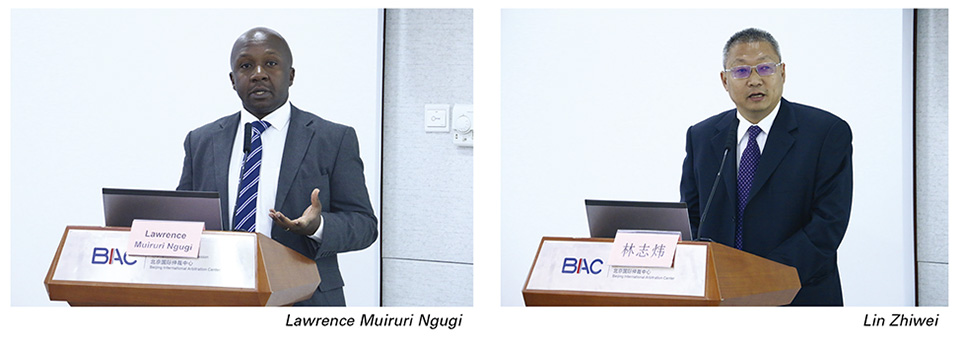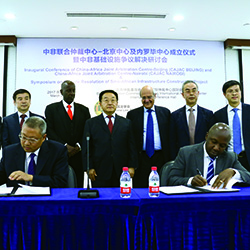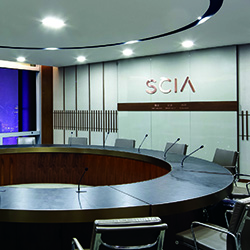![]()
In March, the Beijing Arbitration Commission/Beijing International Arbitration Centre (BAC) and the Nairobi Centre for International Arbitration (NCIA) formally founded the China-Africa Joint Arbitration Centre – Beijing (CAJAC Beijing) and China-Africa Joint Arbitration Centre – Nairobi (CAJAC Nairobi).
The establishment of the CAJAC Beijing and the CAJAC Nairobi are important measures in building the Sino-African joint dispute resolution mechanism. Based on the platform of the CAJAC, the BAC and the NCIA will work together with each other and provide Chinese and African commercial entities with more qualified and efficient dispute resolution services, and thereby assist with the trade communication and economic development between China and African countries.
It is a cornerstone of China’s foreign policy to develop cooperation with African countries, and the establishment of the CAJAC is an inevitable requirement for upgrading Sino-African economic and trade cooperation, and a significant pillar for the promotion of Sino-African legal cooperation. It is hoped that CAJAC will lay a solid foundation and establish its own presence within the international arbitration community.
 Under the background of the Belt and Road Initiative and the Africa Agenda 2063, the economic, trade and investment cooperation between China and Africa will deepen further, and it is therefore important to create a forum for the effective resolution of potential disputes and thereby to promote such cooperation. As a leading dispute resolution institution in Asia Pacific, the BAC has, with the coordination and guidance of the China Law Society, reached cooperation intention with the NCIA, and the establishment of the CAJAC will further strengthen the foundation of the Sino-African legal cooperation. The BAC will work closely with the NCIA to build the CAJAC-Beijing and the CAJAC-Nairobi into an arbitration institution providing qualified, efficient and professional dispute resolution services to commercial entities engaged in Sino-African trade and investment.
Under the background of the Belt and Road Initiative and the Africa Agenda 2063, the economic, trade and investment cooperation between China and Africa will deepen further, and it is therefore important to create a forum for the effective resolution of potential disputes and thereby to promote such cooperation. As a leading dispute resolution institution in Asia Pacific, the BAC has, with the coordination and guidance of the China Law Society, reached cooperation intention with the NCIA, and the establishment of the CAJAC will further strengthen the foundation of the Sino-African legal cooperation. The BAC will work closely with the NCIA to build the CAJAC-Beijing and the CAJAC-Nairobi into an arbitration institution providing qualified, efficient and professional dispute resolution services to commercial entities engaged in Sino-African trade and investment.
Since China and Kenya established diplomatic relations in 1963, Kenya has enjoyed increased trade year by year and frequent communication between Chinese and Kenyan people. Mombasa, as the second largest city of Kenya and a trade port, is a freight transfer station for overseas cargoes entering Africa, and thus is very important to the Sino-African economic and trade relationship. The NCIA is equipped with refined arbitration rules, as well as support from local authorities and trust from African enterprises, and therefore it looks forward to promoting the development of arbitration based on CAJAC in the future and providing Chinese and African clients with a reliable dispute resolution platform.
The inauguration ceremony in Beijing saw Lin Zhiwei, secretary general of the BAC, and Lawrence Muiruri Ngugi, chief executive of the NCIA, sign a cooperation agreement on the establishment of a Sino-African joint dispute resolution mechanism between Beijing Arbitration Commission/Beijing International Arbitration Centre and Nairobi Centre for International Arbitration on behalf of the BAC and the NCIA, respectively.
Zhang Mingqi, vice-chairman of the China Law Society; Gu Zhaomin, director of public relations for the China Law Society; Arthur Igeria, chair of the board of the NCIA; Xin Xiuming, vice-chairman of the China International Contractors Association; Huang Wen, deputy secretary general of the Shanghai International Arbitration Centre; and Michael Kuper, president of the Arbitration Foundation of Southern Africa, all witnessed the signing and inaugurating ceremony.
Ever since the presentation of the CAJAC idea in 2012, CAJAC-Johannesburg was founded in 2015 in coordination with the Arbitration Foundation of Southern Africa, with a goal of looking forward to uniting Chinese and African arbitration institutions and creating international dispute resolution rules to the benefit of developing countries. Sino-African legal cooperation is aimed at building a platform for exchange between the Chinese and African legal circles, and to promote
Sino-African cooperation and development, so as to contribute to the realisation of the Chinese dream.
As an important arbitration institution within Asia Pacific, the BAC has endeavored to provide clients with qualified dispute resolution services and to promote the development of the Chinese diversified dispute resolution industry. The establishment of the CAJAC-Beijing will create a larger platform for realising the prospect of building the BAC into a world-class diversified dispute resolution centre. The BAC welcomes colleagues from different circles to continue to pay attention to the diversified dispute resolution industry.

For more Dispute Resolution Special Report in this issue
 Asia gears up for international arbitration
Asia gears up for international arbitration
Developments across the region are supporting the development of alternate dispute resolution mechanisms that will promote further investment into Asia’s …
 Q&A – Katherine Yap, chief executive of Maxwell Chambers
Q&A – Katherine Yap, chief executive of Maxwell Chambers
Singapore’s Maxwell Chambers is an integrated dispute resolution complex housing best-in-class hearing facilities and support services, as well as top international alternate dispute resolution (ADR) institutions. …

Asian-mena Counsel speaks to Tom Glasgow, investment manager for Asia at IMF Bentham, about the environment for third-party funding in the region…



